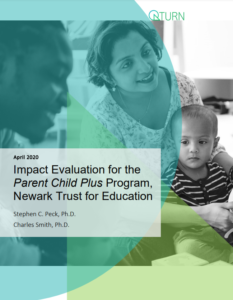The Newark Trust for Education (NTE) Parent Child Plus (PC+) program is an evidence-based early childhood education program for families in the Newark, NJ. NTE seeks to evaluate performance by conducting analyses of existing data for a cohort of over 80 families, assessed four times over 46 weeks using observational measures of parenting practices and children’s socio-emotional skills. PC+ is intended to result in “improved child behaviors related to social‐emotional development and self‐regulation skills” (Organizational Research Services [ORS], 2010, p. 23).
The Quality-Impact-Equity Design and Methods (QDM) Toolbox (Smith, Peck, Roy, & Smith, 2019; Smith, Peck, & McNeil, 2020) was used to: (a) reconfigure existing measures for Parenting Practice Quality and Child SEL Skill to maximize reliability and validity for measuring socio-emotional skills and learning (SEL); (b) produce holistic profiles of parent and child skill (e.g., “whole child”) at each timepoint; and (c) apply pattern-centered analytics to estimate impact and equity effects of the PC+ program as implemented in Newark. Please note: We define impact in terms of the actual “in-the-world” structure of causes and effects, not in terms of counterfactuals. A brief description of the QDM methodology is provided in Appendix A (see also Smith et al., 2019)..
The PC+ program results reveal an overall impact pattern that suggests both a strong relation between parent and child skills and an effect of home visitors on both parent and child skills. Although, in almost all cases, the children of parents with high or growing parenting skills outperformed children with low or declining parenting skills, many children with parents in the low-skill profile for Parenting Practice Quality still experienced growth in SEL skills. This finding suggests that PC+ is working as it should, with parents and home visitors both having direct effects on child SEL skill growth. To fully demonstrate the impact of the NTE PC+ program given this “triadic” causal flow, we recommend (a) improving measures of PC+ fidelity and (b) including a small no-program sample of parents and children.
Contact QTurn to request Report Appendices A-I.
Peck, S. C., & Smith, C. (2020). Impact Evaluation for the Parent Child Plus Program, Newark Trust for Education. Ypsilanti, MI: QTurn.

